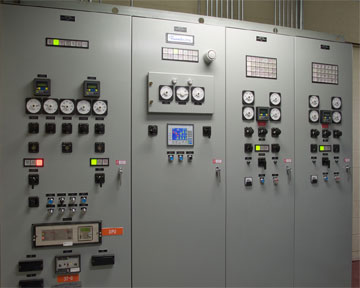 |
Healthcare Network Offers Glimpse of the Future of Backup Power
A typical backup power system was not good enough for Joe Middleton, the forward-thinking vice president of Bassett Healthcare in upstate New York. After spearheading an extensive upgrade, he has made the provider a showpiece of self-sufficiency.
"Not only has healthcare technology become more and more sophisticated, but the continuous delivery of electronic medical information has become critical," says Middleton. While the original power control system took care of basic life/safety needs, the recent upgrade was based on Bassett's managerial decision to better serve its patients. These days, Middleton asserts, the loss of power to an ever-growing number of modern diagnostic and treatment devices is not acceptable. Likewise, the loss of computer access to patient drug histories, digital radiology films, and other electronic records would be a serious setback for doctors, nurses, and ultimately patients. Middleton estimates the revenue loss from an 8-hour outage would be $1,000,000, so Bassett isn't taking any chances. "A reliable power system really needs to be a bottom-line calculation," he adds. "Unfortunately, most healthcare facilities have not realized this yet."
Bassett operates a teaching hospital (the 180-bed Mary Imogene Bassett Hospital in Cooperstown), a research institute, and clinics serving eight counties. Thanks to two extra oil-powered generators and state-of-the-art switchgear designed and built by Russelectric Inc., of Hingham, Massachusetts, the network's backup power system goes far beyond mandated life/safety loads, exceeding the capabilities of most other hospitals.
 |
With a self-sufficient emergency power system that exceeds the capabilities of most other hospitals, the Mary Imogene Bassett Hospital, in Cooperstown, New York, is the hub of Bassett Healthcare, which operates 24 facilities in all, including a network of regional clinics. |
Bassett Healthcare's emergency power system is programmed for two stages of load pickups. When the normal utility feed is lost, Russelectric switchgear immediately transfers critical life/safety loads (including minimal lighting and the HVAC system) to three older 900kW, 480V gensets. This is as far as the typical hospital emergency power system goes. But if the outage continues for five minutes, the two newer 2mW, 12.47kV gensets kick in, picking up all loads and thus restoring full power to the hospital and 15 other buildings.
Full power makes a big difference. The National Fire Protection Association's National Electrical Code says only a certain percentage of electrical receptacles (outlets) in an operating room (OR) must be on emergency power, not all of them. "You can't count on two hands the number of electrical devices in our cardiovascular OR," says Middleton. So at Bassett, five minutes after the utility feed is lost, all receptacles are live again. At that point, Bassett facilities are energy independent, generating all their own primary power. The system can back-feed and feed around any fault on the campus. When the outage is over, the system gradually retransfers all loads to the utility.
But that's not all. A separate backup system ensures seamless power to Bassett's data center, with no delays or interruptions whatsoever. In addition, every outlying clinic has its own Russelectric automatic transfer switch.
Impressed by Russelectric's support services as well as by the quality of its equipment, Bassett's management made Russelectric its sole-source supplier for emergency backup power equipment.
"We depend on Russelectric's 24-hour field service for everything except routine daily maintenance," says Middleton. "When we have issues with our system that are beyond our local capabilities, no matter how complex, Russelectric is there without delay — their service is timely and spot-on. After all, when you invest in a power control system, you're buying much more than gray boxes!"
 |
This lineup of Russelectric switchgear is one of several that ensure complete energy self-sufficiency for Bassett Healthcare. |
And not all "gray boxes" are alike, as Middleton is quick to point out: "When you look at a Russelectric transfer switch, you can see that the quality of the buswork, the control wires, the layout, etc., is dramatically better than that of competitors' switches."
The Russelectric switchgear can also be programmed for baseload peak-shaving. Thanks to a lucrative agreement between Bassett Healthcare and the regional power company, Bassett's backup power system pays for itself over time. An "interruptible power contract" gives the utility permission to drop Bassett from the regional electrical grid (with advance notice) during periods of peak demand. In return, the utility pays Bassett — at a rate much higher than what Bassett pays for its normal feed — for every megawatt Bassett generates while off-line. Bassett also has the capacity to export power to the grid.
"It's great for us," says Middleton. "We're off the grid for a few hundred hours a year, mostly in the summertime, when the power we generate is of higher quality than what we get from the utility. Our power is rock-solid, with stable frequency and voltage. But on the grid, with all the air-conditioning demands, we see large switching transients as new power sources are switched in and out."
Summing up all he has learned from the successful upgrade, Middleton says, "If your infrastructure is flexible, you can build on it. To do that, you need to partner with a nimble, service-oriented company like Russelectric."
For more information, contact Russelectric Inc.:
1-800-225-5250 or click here: www.russelectric.com
|
 Building Maximizer Newsletter from Building Operating Management
Building Maximizer Newsletter from Building Operating Management  Building Maximizer Newsletter from Building Operating Management
Building Maximizer Newsletter from Building Operating Management